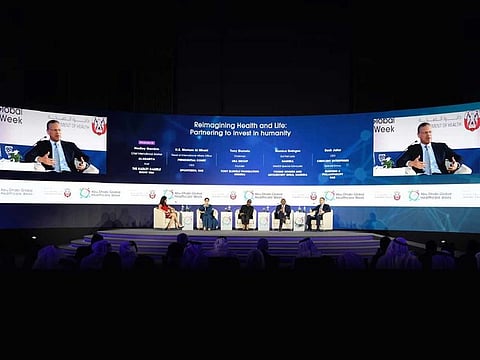Health Leaders Forum sparks cross-sector collaboration for global healthcare transformation
Health Leaders Forum's impactful discussions on advancing global healthcare

Abu Dhabi: The Health Leaders Forum, which launched the inaugural edition of Abu Dhabi Global Healthcare Week on May 13, 2024, brought together 250 global leaders in healthcare and life sciences, representing the private and public sectors, philanthropy, and civil society. The forum aimed to address the urgent need for decisive, cross-sector collaboration to tackle multifaceted pressing concerns and transform the global health ecosystem.
The opening plenary session, titled ‘Foundational Change: Will philanthropies lead tomorrow’s health-focused private-public partnerships?’, highlighted the importance of robust investment in overall population health, the transformative power of sustainable investment, and the need for a fundamental shift in healthcare investment structures. This includes redefining the role of public-private partnerships to ensure equitable health outcomes worldwide.
Global thought leaders, including Mariam bint Mohammed Almheiri, UAE Head of International Affairs at the Presidential Court and CEO of 2PointZero; Monica Geingos, former First Lady of Namibia and UNAIDS Special Advocate on Young Women and Adolescent Girls; Tony Elumelu, Chairman of UBA Group and Founder of Tony Elumelu Foundation in Nigeria; and Badr Jafar, CEO of Crescent Enterprises and Special Envoy for Business & Philanthropy, participated in the panel.
Highlighting how strategic cross-sector partnerships and innovative funding models can create lasting positive change, Badr Jafar underscored the importance of a shared vision for healthcare transformation, with clear measurable goals focused on addressing socioeconomic disparities.
The session emphasized the importance of open data standards and clear information sharing, such as the World Bank's frameworks, for building trust in healthcare public-private partnerships. Jafar highlighted the role of multi-stakeholder partnerships, where philanthropy offers catalytic funding and early-stage innovation, while the private and public sectors bring their combined expertise and resources.
The discussion delved into the potential of strong multi-stakeholder collaboration, particularly through public-private partnerships (PPPs), which combine public sector vision and resources with private sector expertise and innovation, accelerating progress on both fronts. The session also highlighted local data and community engagement through PPPs to develop sustainable solutions that empower residents and strengthen healthcare capacity locally, regionally, and globally.
Addressing the significant funding gap and the need for ample resources, Badr Jafar noted the crucial role of philanthropy globally in supporting healthcare advancements, particularly in low-income and developing nations. He highlighted that the top 100 private foundations and grant makers contribute approximately USD $46 billion annually to health-related causes, representing nearly a quarter of all charitable donations worldwide.
Sign up for the Daily Briefing
Get the latest news and updates straight to your inbox



